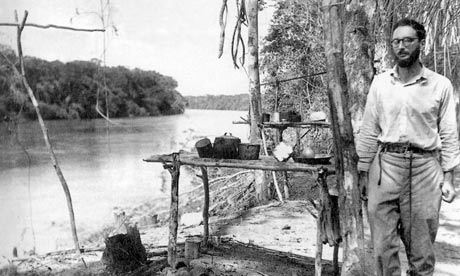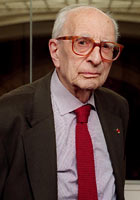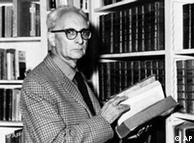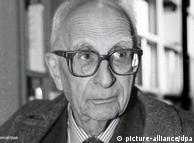數月之前 見過貝嶺一次 C. Milosz百年冥誕紀念會(波蘭駐臺文化辦事處)......
The Chinese writer Bei Ling recently presented his autobiography
in Berlin. His book talks about Beijing's literary underground in the
1980s and the trials of being a writer in exile.
The small bookstore in the east of Berlin was packed. With his long
hair tied back and wearing a black cotton smock, the author seemed the
epitome of the avant-garde poet as he read to his audience from his
laptop: "At the most extreme end of exile / I am a constant curse / On
the map of my homeland."
The Chinese writer Bei Ling was in the store in Berlin to launch his autobiography. His book tells the story of Beijing's literary underground in the 1980s and the trials of being a writer in exile.
"Exiled: On China" is Bei Ling's second book and has just been published in German. However, it was originally supposed to be published by a Taiwanese firm.
"The publisher has good connections with China," the poet explained. "The contract was already signed but they decided not to print the book."
Democracy wall
In the book, Bei Ling describes how he discovered the "democracy wall" on Beijing's Xidan Street as a 19 year old. From December 1978 to December 1979, activists from the pro-democracy movement discussed ideas by posting big-character posters on this wall.
Bei Ling, whose first book is a biography of Nobel Peace Prize winner Liu Xiaobo, says that he had never heard of "human rights" until then and was fascinated by the notion, giving in to an inner compulsion to express himself about politics and literature.
He also brings to life the smoky back rooms where tea would be brewed and underground poets would discuss their works.
However, most of the book is about exile. Bei Ling received a grant to travel to the US a year before the protests broke out on Tiananmen Square back in 1989. He followed developments there from afar, always wondering whether he should fly back to take part. He never did.
After the Tiananmen Square massacre of June 4, 1989, in which hundreds, perhaps thousands, of protesters were killed by the Chinese army, he stayed in the US.
However, his English was poor, he felt lonely, and he fell into a depression. "I was not only illiterate in English, I was a complete idiot," he recalled in Berlin. "In class, I was nothing more than a stuttering refugee, not a writer."
Thus, he explained, shortly after discovering the power of words and the idea of freedom, he lost the capacity to express himself.
'Free but not comfortable'
At the end of the 1990s, Bei Ling returned to China where he tried to publish an underground magazine. He was soon arrested and deported to the US and has not been allowed to return to Beijing since.
"I feel comfortable in China," he explained. "But not free. Whereas I feel free in the West but not comfortable."
In Berlin, he praised the fact that the international community had become more attentive to the plight of dissidents in China. “Everybody knows Ai Weiwei is a dissident artist. There was nobody 20 years ago in China whom the whole world knew as a voice of dissent.”
Bei Ling first became known to a wider audience in Germany in 2009 when China was the official guest of honor at the Frankfurt Book Fair. He and the poet Dai Qing were invited to take part in a symposium about Chinese literature along with an official delegation.
As the result of pressure from Beijing, his invitation was then withdrawn. However, the outcry in the media and the public was so great that he was re-invited. When he came onto the stage, the official Chinese delegation left the room.
The affair, which he describes in his book, has paradoxically become pertinent again. Bei Ling's reading in Berlin took place just hours after his return from London where he had taken part in an event organized in protest against this year's London Book Fair where China is guest of honor. The organizers seem to have drawn their own conclusions from the PR fiasco at the Frankfurt Book Fair in 2009 by not inviting any exiled writers or dissidents.
Bei Ling said he had met a good friend from his days in the Beijing underground, whom he had not seen for years. He was part of the official delegation. "Those writers who didn't leave China at the time have now been bought by the state," he said.
Author: Matthias Böllinger / act
Editor: Grahame Lucas
The Chinese writer Bei Ling was in the store in Berlin to launch his autobiography. His book tells the story of Beijing's literary underground in the 1980s and the trials of being a writer in exile.
"Exiled: On China" is Bei Ling's second book and has just been published in German. However, it was originally supposed to be published by a Taiwanese firm.
"The publisher has good connections with China," the poet explained. "The contract was already signed but they decided not to print the book."
Democracy wall
In the book, Bei Ling describes how he discovered the "democracy wall" on Beijing's Xidan Street as a 19 year old. From December 1978 to December 1979, activists from the pro-democracy movement discussed ideas by posting big-character posters on this wall.
Bei Ling, whose first book is a biography of Nobel Peace Prize winner Liu Xiaobo, says that he had never heard of "human rights" until then and was fascinated by the notion, giving in to an inner compulsion to express himself about politics and literature.
He also brings to life the smoky back rooms where tea would be brewed and underground poets would discuss their works.
However, most of the book is about exile. Bei Ling received a grant to travel to the US a year before the protests broke out on Tiananmen Square back in 1989. He followed developments there from afar, always wondering whether he should fly back to take part. He never did.
After the Tiananmen Square massacre of June 4, 1989, in which hundreds, perhaps thousands, of protesters were killed by the Chinese army, he stayed in the US.
However, his English was poor, he felt lonely, and he fell into a depression. "I was not only illiterate in English, I was a complete idiot," he recalled in Berlin. "In class, I was nothing more than a stuttering refugee, not a writer."
Thus, he explained, shortly after discovering the power of words and the idea of freedom, he lost the capacity to express himself.
'Free but not comfortable'
At the end of the 1990s, Bei Ling returned to China where he tried to publish an underground magazine. He was soon arrested and deported to the US and has not been allowed to return to Beijing since.
"I feel comfortable in China," he explained. "But not free. Whereas I feel free in the West but not comfortable."
In Berlin, he praised the fact that the international community had become more attentive to the plight of dissidents in China. “Everybody knows Ai Weiwei is a dissident artist. There was nobody 20 years ago in China whom the whole world knew as a voice of dissent.”
Bei Ling first became known to a wider audience in Germany in 2009 when China was the official guest of honor at the Frankfurt Book Fair. He and the poet Dai Qing were invited to take part in a symposium about Chinese literature along with an official delegation.
As the result of pressure from Beijing, his invitation was then withdrawn. However, the outcry in the media and the public was so great that he was re-invited. When he came onto the stage, the official Chinese delegation left the room.
The affair, which he describes in his book, has paradoxically become pertinent again. Bei Ling's reading in Berlin took place just hours after his return from London where he had taken part in an event organized in protest against this year's London Book Fair where China is guest of honor. The organizers seem to have drawn their own conclusions from the PR fiasco at the Frankfurt Book Fair in 2009 by not inviting any exiled writers or dissidents.
Bei Ling said he had met a good friend from his days in the Beijing underground, whom he had not seen for years. He was part of the official delegation. "Those writers who didn't leave China at the time have now been bought by the state," he said.
Author: Matthias Böllinger / act
Editor: Grahame Lucas
貝嶺 /簡介:
貝嶺,1959年生於上海,6歲遷回北京,曾下鄉務農及在工廠做工,1978至1982年在大學就讀期間參加北京西單民主牆運動及地下文學活動。大學畢業
後曾作過教師、圖書館管理員、夜間病人看護、記者、中國社科院于光遠辦公室編輯、深圳大學管理系講師。1988年底赴美國文學訪問。現任美國哈佛大學費正
清東亞研究中心研究員。著有詩選《今天和明天》(中國漓江出版社)、《主題與變奏》(黎明文化)。1993年在波士頓創立《傾向》文學季刊。是中國大陸旅
美的流
| 書房閑話 |

關於主權、人權及寫作─和捷克總統瓦斯拉夫‧哈維爾對話
【貝嶺/專訪 】
1999年9月3日,捷克共和國總統、著名劇作家瓦斯拉夫‧哈維爾(Vaclav
Havel)在捷克共和國首都布拉格的總統府會見了正在捷克短期渡假及工作的旅美中國詩人、《傾向》文學人文雜誌總編輯貝嶺,會見中,哈維爾和貝嶺進行了
廣泛的交談,就他對中國未來的看法、何時前往中國訪問、人權與國家主權的關係、自己未來的寫作規畫及和其他著名作家的關係等問題回答了貝嶺的提問。
世紀對談
編按:1999年9月3日,捷克共和國總統、著名劇作家瓦斯拉夫‧哈維爾(Vaclav
Havel)在捷克共和國首都布拉格的總統府會見了正在捷克短期渡假及工作的旅美中國詩人、《傾向》文學人文雜誌總編輯貝嶺,會見中,哈維爾和貝嶺進行了
廣泛的交談,就他對中國未來的看法、何時前往中國訪問、人權與國家主權的關係、自己未來的寫作規畫及和其他著名作家的關係等問題回答了貝嶺的提問。
陪同哈維爾總統會見貝嶺的還有總統辦公室主任、以及亞洲事務顧問MILAN SLEZAK、總統府新聞辦公室主任MARTIN
KRAFL等,交談分別用中文和捷文進行,並由捷克翻譯互譯。哈維爾先生的回答最後由捷克布拉格的查理大學漢學系主任羅然(Olga
Lomova)教授譯成中文。
主權、人權及寫作
貝嶺(以下簡稱貝):哈維爾先生,您好!您還記得1995年6月在哈佛大學,在您獲得榮譽博士學位並擔任哈佛大學畢業典禮演講人的典禮之後,我們曾短暫地
見過面嗎?
哈維爾(以下簡稱哈):我記得,記得我們見過面
貝:我想聽聽您對中國的現在及未來的看法。中國是一個有著廣大人口的巨大國家。中國政府近二十年來主要致力於發展經濟,容許、最後並鼓勵了自由的市場經
濟。可是,在政治上,中國仍舊是一個由共產黨控制一切的國家,中國目前沒有被西方稱之為民主的主要制度,如:政黨政治,自由的省市及地方選舉、由不同的政
黨推出候選人的總統競選和議會選舉,沒有獨立的媒體和新聞自由,甚至沒有嚴格意義上的自由出版(所有的出版社都是國營的,沒有私人出版社),而近二十年來
城鄉社會的惡質商業化,也使文化和傳統受到了空前的摧毀。您怎樣看待今日中國的情形?
長期缺少政治的民主不可能持續
哈:當然,中國是一個很大的國家,它的歷史和文化傳統和制約著我們歐洲生活的歷史文化傳統很不一樣。在中國,很多情況是特別的。可是我想有一件事在中國和
在世界上的任何的地區是同樣的,也就是說,以自由的經濟和經濟主體的獨立性為基礎的經濟發展,假如長期缺少政治的民主,是不可能持續的。這種不對稱的情況
可能維持十年、甚至二十年,但不可能是永久的,這在地球上的任何一個地方都一樣。
我曾經好幾次和其他國家的政治領袖討論過這個問題。在新加坡,我記得曾跟他們的已差不多變成神的「新加坡奇蹟」的創造者李光耀先生也談到這一個問題。李先
生說,他們的歷史和文化傳統和西方不一樣,他們是另一個世界,在新加坡,把市場經濟的蓬勃發展和稍微有一點獨裁主義特徵的政治制度結合在一起是完全可能
的。他甚至強調,不只是可能,而且和英國和歐洲大陸正相反,它是必要的。
一方面我很有興趣聽他的話,並使我能意識到兩種不同文化的差別,可是另一方面,我也就這一點和他爭論,因為我能提出很具體的例子,用事實證明,兩種那麼相
反的東西(自由的經濟、不自由的社會)的共處共存是不能長期存在的。這是我對中國現狀的基本看法。
確實很想去中國
貝:據我所知,中國政府和江澤民主席曾邀請您正式訪問中國,您的夫人也曾訪問過台灣,您是否打算前往中國大陸呢?
哈:在我目前還是捷克共和國總統的時候,我確實很想去中國,我還有兩年半的時間(指總統任期-訪者註)。我確實收到了很熱烈的邀請,請我去中國訪問和參
觀。但我希望把我的正式訪問和一些我個人也感興趣的訪問和見面放在一起進行,我不知是否可能。比如:我同時也想訪問台灣、訪問西藏,我也想跟一些持不同政
治觀點的中國公民見面,也聽聽他們的想法。
貝:以目前中國政治領導人的思考方式,我想他們會很難答應您的某些請求。但隨著中國的逐步開放,您的著作、許多文章,也包括少量的文學作品給了中國的知識
份子相當的影響。我的建議是,假如您能去中國,您應該在中國的某一所著名大學發表演講,並直接和大學中不同思想觀點的知識份子及駐華大使館內會見一些您想
見的中國作家、戲劇導演和知識份子,至少可以和他們探討文學,瞭解中國的文學發展,假如您去台灣,相信可以更為自由地見任何人,在任何地方發表演講。您也
可以比較中國大陸和台灣地區政治制度、文化發展以及人文傳統的異同。
希望重回戲劇生活
哈:我真的希望會有這樣的機會。假如去中國大陸,除了北京和上海之外,我還希望去看看別的地方,比如香港。這一切目前都還是一些抽象的願望,現在還沒有位
這樣的訪問做任何準備。
貝:我注意到今(1999)年4月29日,您在加拿大國會的演說中關於人權高於國家主權的主題思考,您認為個人比某依國家更為重要,您強調了「可以為某人
或值得為他而死的唯一價值-民族國家,已經超過了其最高頂點而開始走下坡路」。我特別對您在這場演說中的最後一段話印象強烈,您說「國家是人的產物,而人
是上帝的產物」。您能再多一點闡述嗎?
哈:我想不應該很快、或用什麼激進的作法去取消或者限制國家的主權。我有一個看法,就是以長期歷史發展的角度來看,人權比國家的主權(一天比一天)更重
要。按照我的看法,未來的國家將成為這個地球上眾多的行政單位之一,如現在的州、地區、市、或各種其他的國際組織或區域組織。所有這一些行政單位在一起要
創造出在一個非常複雜的世界上所有人類共處的結構。但是,在這結構上面,我希望還有一種最高價值-人。尊重人、尊重人各方面的自由、尊重人的尊貴。這種對
人的尊重,應該是整個人類社會共同承擔的責任。
貝:您是一個劇作家,是一個喜歡在寫作中探究人的存在境況的文學家。在您一手促成的1989年底將捷克共產黨政府和平地請下台的被稱為「天鵝絨革命」之
後,您成為了國家的總統,您在做總統的近十年中,還有時間或可能從事文學或戲劇的創作嗎?將來,在您的總統任期結束之後,您會有特定的寫作生涯規畫嗎?這
是一個作家才會問您的問題(笑)。(此刻,哈維爾也誠實和他的顧問們笑著用捷文說道:我一句也聽不懂他講的中文,而他也聽不懂我講的捷語,藉助於翻譯,我
們在交談。這種情景本身就像是一齣荒誕劇。)
哈:謝謝!我真希望能重新回到寫我的戲劇、文章的生活中去,將來,在我總統任期結束後,除了文學寫作之外,我可能也會寫自己的回憶錄。而且,將來不作總統
時,我一定會很輕鬆、舒服。寫作時也不必考慮到各種社會政治因素,不必向我現在準備總統演講時那麼小心挑選詞句,講話那麼枯燥乏味。
貝:1992年,您發表了一篇著名的演講,叫做「後共產黨主義的惡夢」(The post-communist
nightmare),隨後,此文刊登在美國著名的《紐約書評》(New York Review of
Book)上,在文中,您分析了共產主義這一人類過去的存在惡夢對今天這一後共產主義時代人類的人性影響。當時,約瑟夫‧布羅斯基(Joseph
Brodsky,美籍俄羅斯流亡詩人,1987年諾貝爾文學獎得主),也在《紐約書評》上就您的這一演講寫了回應的公開信,批評了您文章中的一些觀點,隨
後您又給予了回覆。這些文章經過中文的翻譯發表在《傾向》雜誌上後,引起了中國的一些知識份子,特別是當時流亡在海外的中國知識份子的關注和思考,請問您
之後有機會再和布羅斯基進行討論嗎?您們見過面嗎?記得您曾邀他和您見面交談,以化解誤會。
哈:是的,布羅斯基寫了這封公開信,跟我之前寫的那篇演講中的觀點進行商榷,以後呢,我也寫了一篇回答。我們的那次商討和爭論具有各種多樣的誤會、錯誤甚至曲解。我們確實討論到有本質意義的問題。也是一個非常重要的主題,可是那次的討論並不成功,混亂了,我不把它當作我思想和著作中輝煌的部分。我們之間的
誤會無疑將來會弄清楚。
貝:可惜的是,布羅斯基已經去世了,由於心臟病突發,於1996年1月在紐約去世的。
哈:他已經去世了嗎?真的嗎?太可惜了,很奇怪我沒有聽到這個消息,真不好意思,這真的令人震驚。
貝:捷克小說家,現居法國的米蘭.昆德拉
在台灣和中國大陸有著很高的文學聲譽,他幾乎所有的小說都已經在中國大陸和台灣被譯成中文出版,他早期的代表作《生命中不能承受之輕》在中國和台灣極其暢
銷。假如我的猜測沒錯的話,當年您本人和他都被剝奪了發表及出版作品的權力,也被視為異議份子,你們曾是好朋友,可是早年您和他在關於捷克作家和知識份子
怎樣在在蘇軍侵佔捷克及後來胡薩克政權嚴酷統治的情形下有所為,及擔當責任上,產生過分歧,也有過一場廣為人知的爭論。您和昆德拉這些年常見面嗎?
哈:我每次去法國一定要和昆德拉見面,大概是今(1999)年3月,我正式訪問過法國,我和我太太和他在一起吃飯,相聚了三、四個小時。我們是好朋友。確實,近三十年前,我們(在海外的報紙上)有過爭論。對於我們當時的爭論,我後來在自傳體對話錄《來自遠方的提問》中,還發表過一些看法。我順便說明一下,
我還是相信,當時說對的是我。中國現在能夠出版昆德拉那些有趣的小說,當然很好。
貝:關於您著作中文版的出版的情況,我也想向您介紹一下,1998年,《獄中書簡─致親愛的奧爾嘉》(Dopisy
Olze)(探索文化出版)是您的第一本著作,正式翻譯成中文在台灣和香港出版。在這之前,您寫於捷克斯洛伐克共產主義制度時期的思想論文及戲劇,曾以
《來自遠方的拷問》,書籍名稱被改為《哈維爾自傳》。我想雖然目前中國大陸仍然無法出版您的著作,但是,您的著作仍能在有著出版自由的台灣和香港出版。特
別是在中國,知識份子讀者非常希望能讀到您的著作。
哈:中國大陸和台灣的讀者和知識份子對我書的興趣當然讓我非常高興。利用這次採訪的機會代我問候中國的讀者和知識份子。謝謝他們的關注和善意。我也感謝你
注意我的著作,甚至幫助我的書有了中國讀者。這些話不是一個有野心的作家說的。現在的世界需要所有的人相互對話和瞭解,這是全人類的共同利益。
貝:謝謝您的會見和一一回答我的問題。
2011.09.03 03:50 am
|
他震驚的是,那位真正觸到他痛處的對手過世了,而那場論爭再也無從繼續了……
布羅茨基曾質疑哈維爾的見解
文 字有時真的奇妙。如果說布羅茨基(Josef Brodsky)是一位深諳人性的思想家詩人,善以犀利的思想力量,密集地將他的質疑擲向對手。而哈維爾(Vclav Havel,1936年10月5日–)則好用他低調的老練和哲人般四兩撥千金般的不疾不徐從容應答。所以,他們的文字一旦碰撞,擦出火花,不僅精采,而且 發人深省。
1994年2月17日,美國最重要的政治和文化雙周刊《紐約書評》(New York Review of Books)上,1987 年諾貝爾文學獎得主、美籍前蘇聯流亡詩人約瑟夫‧布羅茨基針對哈維爾在1993年5月27日的《紐約書評》上發表的、原為哈維爾獲得美國喬治‧華盛頓大學 授予其總統勳章時發表的演說〈後共產主義的噩夢〉(The Post-Communist Nightmare)一文,寫了一封很長的公開信,質疑作為總統的哈維爾在這篇演講中提出的許多見解。為此,哈維爾寫了回覆的公開信,並在信中邀請布羅茨 基經由直接見面,深入探討。
這是一場發人深省的思想論戰,兩位既有深厚的歐洲文明背景,又有共產主義制度下牢獄經驗的作家,通過文字一來一往,其涉及的問題不僅深刻,而且讓我難以忘懷。
震驚「對手」竟已過世
1999 年夏天,我到作為總統府的布拉格城堡拜訪哈維爾,在訪談時,我特別詢問哈維爾,在他們當年那場公開論爭後,他是否和布羅茨基見了面,並一起坐下來深入探討 過他們顯然有著明顯分歧的觀點。哈維爾沉吟了一下,告訴我,他還沒有機會和布羅茨基見面交談。看得出來,他對我會關注那場論爭頗感訝異。
「可是,布羅茨基已經過世了。」我說。
「什麼!他已經去世了?真的嗎?」哈維爾一下子愣在那裡,他驚呆了。
「由於心臟病突發,他已於1996年元月在紐約去世了……」我說。
交談在一瞬間凝固了,我那句未說完的話,似乎也僵立在空氣中。哈維爾睜大眼睛望著我,瞳孔一動不動,透著一種複雜、讓我難以看透的神態。我也愣在那裡,我和他都被震驚了,但原因各不相同。
他震驚的是,那位真正觸到他痛處的對手過世了,而那場論爭再也無從繼續了。
我震驚的是,布羅茨基已經逝世兩年九個月了,哈維爾竟不知!難道因貴為總統,他不僅遠離文學世界,甚至連如此重大的國際文學「事件」也無從獲知了?
我看著哈維爾,哈維爾則看著正緊張地不知怎麼應付「老闆」的兩位助理,哈維爾的目光嚴峻,顯然,他對助手們未能及時告知布羅茨基逝世的消息頗為惱火。可這 兩位只知道政治世界的助理,一臉窘困,面面相覷,因為他們不僅不知道布羅茨基是誰,甚至搞不清楚「老闆」究竟和布羅茨基發生了什麼!在那已然僵住的氛圍 中,哈維爾不得不用捷克語向他們解釋我們這一對話的來龍去脈。我看出哈維爾的窘迫,我不僅觸及了一個敏感、微妙的話題,而且將一個噩耗帶給了他。
我知道,哈維爾這些年病得很重,多次和死神擦身而過。就是在此刻,在他見我之時,我面對的仍是一位大病初癒、面龐浮腫、透著疲憊的哈維爾。
從1989年底到1999年那十年,哈維爾所經歷的幾乎都是政治。1996年一月,他那位深受人民愛戴的妻子奧爾嘉(Olga Splichalov, 1933-1996)因患癌症逝世了。同時,他還要和他的政治對手、前總理克勞斯進行對於捷克未來的重大辯論。也許,他真的無暇關注文學世界裡發生的一 切。況且,奧爾嘉竟是和布羅茨基同年同月過世的。
布羅茨基將詩視為人類良知最後的庇蔭
布羅茨基是一位真正的文學天才,他在十四歲那年就厭倦了制式化的學校教育,從中學退學,之後便再也沒有去上學讀書。他是一位天性驕傲、專和統治者作對的倔 頭。他痛恨謊言,也好修理世上那些自以為是的得勢者。他對文學有著絕對的標準,並將詩視為人類良知最後的庇蔭。他早年的詩作哀婉,孤立卓絕,沒有一絲雜 音。1996年一月的某個深夜,他因心臟病突發,在已定居近二十年的紐約布魯克林區逝世。那一年,他才五十六歲。
布羅茨基逝世後,俄羅斯總統葉爾欽在哀悼這位前蘇聯流亡詩人的唁電中,稱他為︰「俄羅斯詩歌的太陽,是繼普希金之後最偉大的俄羅斯詩人。」他稱前蘇聯共產黨政府將布羅茨基驅離祖國是「俄羅斯永遠的羞恥」。
避開你是因為「不方便」還是瞧不起?
在〈後共產主義的噩夢〉這篇演說一開頭,哈維爾說了一個發人深省的小故事,他說:「記得曾有一段時間,我的朋友和故舊總會在街上避開我,雖然我自己從未那 樣想過,但他們在某種意義上把我看成他們的良心,如果停下來和我交談,就會感到不得不為自己沒有去反抗那個政權而道歉,要嘛,就要向我解釋為什麼他們沒有 那樣去做,抑或是以宣稱反抗無論如何也無濟於事來為自己辯護。對警察可能跟蹤我的恐懼是造成這種情況的另一個原因,和我交談會使他們的處境變得複雜。與其 如此,不如就不走近我。這樣既可以省去不愉快的對話,同時也避免了可能隨之而來的迫害。
「簡單地說,我成了這些朋友的一種不方便,而對於不便最好避開為是。幾十年來,民主世界最主要的噩夢是共產主義。在共產主義雪崩般坍塌三年後的今天,另一個噩夢──後共產主義──似乎已取而代之……」
正是這個小故事,和哈維爾推導出來的結論,觸動了敏銳的布羅茨基,看得出來,布羅茨基已對哈維爾關注多年,他讀出了這篇演講裡有著某種政治家或政客慣用 的、帶著取悅大眾味道的「寬宏大量」。布羅茨基當即寫下一封洋洋灑灑、誠懇但不乏譏誚的公開信,那是一封不僅寫給總統,也是寫給作家同行,甚至是寫給同在 極權制度下坐牢的獄友哈維爾的信,布羅茨基寫道:「在我看來,總統先生,你那出名的禮貌,在這裡,似乎沒有為你的事後聰明帶來多少益處,你真的敢肯定人們 當時迴避你,僅僅是因為出於尷尬和擔憂──潛在的迫害,而不是因為他們想到那個制度表面上的穩定而瞧不起你?你真的敢肯定他們之中沒有人把你當成一個被監 視的、厄運將臨的人,在這樣一個人身上浪費太多時間是愚蠢的嗎?……難道你沒有想像過他們在黃昏時分對他們的妻子說:『我今天在街上看到哈維爾。這下夠他 受的了。』抑或,難道是我誤解了捷克人的個性?」
哈維爾一讀到《紐約書評》轉寄來的布羅茨基的公開信後,立即在《紐約書評》上向布羅茨基回覆了一封短信,信中亦不乏反唇相譏。他說:「由於你的道德力量和 才能,你和其他相對來說僅僅是一小批的作家,接下了俄羅斯十九世紀偉大詩人、小說家和評論家,以及少數幾個不可壓抑的藝術家的工作。你嚮往自由,而且你贏 得了。當你的親密或疏遠的朋友看到你為那種勝利付出代價而離開他們走向監獄,他們很有可能會說,他們一點也沒有感到正處於自由所帶來的不方便和危險中。說 不定他們還由此而獲得了某種見不得人的滿足哩。」
哈維爾跟我在關於他和布羅茨基論戰這個話題上的交談是這樣結束的,哈維爾告訴我:「其中有討論到本質意義的問題,也是一個非常重要的主題。可是那次的討論並不成功,混亂了,我不把它當作我思想和著作中輝煌的部分。」
一個能量的噴泉,誠實的噴泉
那是一個陽光燦爛的布拉格夏末,我和哈維爾交談時涉及的範圍廣泛。他像是一位和藹的長者,我感受著他的靦腆、輕鬆和幽默感,也看到了他獲知布羅茨基逝世後的震驚和困惑。當然,他那敏感、深思熟慮的政治家式反應,也給我留下了深刻的印象。
我理解哈維爾的遺憾,我從他們的討論中深受啟發,並由此引發了更多的思考。我相信,作為總統的哈維爾和作為劇作家、作為一個異議分子的哈維爾之間差異頗 大。對於怎樣看待人、人心和人性?作為作家的布羅茨基和已是總統的哈維爾看待問題的視角顯然不同。哈維爾本不是一個喜歡取悅大眾的人,但哈維爾寫這篇演講 時面對的恰恰是大眾,正如布羅茨基在公開信中所說:「有些事是隨著講壇而來的,不過我們應該抵制它……」作為總統的哈維爾顯然不可能將捷克人在專制時代的 墮落毫不留情地予以揭示。更不可能不留情面地用文字「拷問」那些當年躲著他的老熟人或認得他的布拉格市民。
而布羅茨基不是這樣,他昂著頭、目光犀利,甚至目中無人。但他無的是平庸,是那些缺乏節制、文字氾濫的作家,以及取悅大眾的政客。多年來,我始終無法忘記 他的那句名言︰「時間只能使邪惡升值。」就像1998年秋天,愛爾蘭詩人、1995年諾貝爾文學獎得主謝默斯‧奚尼(Seamus Heaney)對我談起布羅茨基時令我動容的說法:「我真的很懷念他。當你在約瑟夫‧布羅茨基面前,首先你感到你是在接近一個能量的噴泉,其次是一個誠實 的噴泉。他從不害怕講真話。但你也是在一個傲慢的噴泉邊,但這不要緊,沒什麼。」
哈維爾並未喪失反省的能力
哈維爾戲劇性的一生確是傳奇。他成名頗早,三十多歲便已是獲得歐美戲劇界注目的捷克劇作家。1977年,他參與起草了具有歷史里程碑意義、也受到舉世注目 的捷克人權文獻《七七憲章》,並成為此一人權運動的發言人。他飽受共產黨政權的懲罰和摧殘,曾多次入獄。1989年十一月至十二月,他領導了捷克斯洛伐克 那場迫使共產黨交出政權、溫和如「天鵝絨」般的革命,在近百萬人民聚集在布拉格的溫斯萊斯廣場,在漫天飛舞的大雪中高喊︰「還給我們吧!政府」、「共產 黨,下台」的呼聲中,在近百萬人民的歡呼和叫喊:「哈維爾,哈維爾」、「哈維爾,當選」、「哈維爾,總統」中當選捷克斯洛伐克共和國總統及後來的捷克共和 國總統。所以,他在西方世界曾有著英雄、聖徒般的光環,被自己反諷地形容為︰「一個奉善良之命的男孩,以頭部撞擊一座被邪惡之王居住的城堡,直至城牆倒 塌,他自己即成了國王,進而英明統治了許多年。」的神話。
哈維爾尚未昏庸,也未喪失自我反省的能力。總統卸任前,哈維爾在紐約市立大學學生中心發表演說〈政治,再見!〉,他清醒地告訴世人:「這一切其實是命運對 我投下的殘酷陷阱。因為,我的確是在一夜之間被彈進神話世界,然後,在接下來回到地上的幾年中,更清楚了解到神話只是人類現實的投射,以及世界的構造絕對 不像神話那樣。於是,在從未嘗試成為神話國王,並發現自己確實在歷史的意外中被逼上這個位置之餘,我並未能免於從令人興奮的革命世界摔落到官僚例行公事的 痛苦。」
對於善好沉思的人,這一直指人心和人性的筆戰彌足珍貴。而且意猶未盡,可隨著布羅茨基的逝去,已成永遠的遺憾。
●本文收錄於近日由新銳文創出版的貝嶺新書《哈維爾︰一個簡單的複雜人》。
|
|
 |
| 《哈維爾︰一個簡單的複雜人》書影。
(圖/新銳文創提供) |
1994年2月17日,美國最重要的政治和文化雙周刊《紐約書評》(New York Review of Books)上,1987 年諾貝爾文學獎得主、美籍前蘇聯流亡詩人約瑟夫‧布羅茨基針對哈維爾在1993年5月27日的《紐約書評》上發表的、原為哈維爾獲得美國喬治‧華盛頓大學 授予其總統勳章時發表的演說〈後共產主義的噩夢〉(The Post-Communist Nightmare)一文,寫了一封很長的公開信,質疑作為總統的哈維爾在這篇演講中提出的許多見解。為此,哈維爾寫了回覆的公開信,並在信中邀請布羅茨 基經由直接見面,深入探討。
這是一場發人深省的思想論戰,兩位既有深厚的歐洲文明背景,又有共產主義制度下牢獄經驗的作家,通過文字一來一往,其涉及的問題不僅深刻,而且讓我難以忘懷。
震驚「對手」竟已過世
 |
| 1999年9月3日,本文作者貝嶺(左)在布拉格城堡的捷克總統府拜訪哈維爾。
(圖/貝嶺提供) |
「可是,布羅茨基已經過世了。」我說。
「什麼!他已經去世了?真的嗎?」哈維爾一下子愣在那裡,他驚呆了。
「由於心臟病突發,他已於1996年元月在紐約去世了……」我說。
交談在一瞬間凝固了,我那句未說完的話,似乎也僵立在空氣中。哈維爾睜大眼睛望著我,瞳孔一動不動,透著一種複雜、讓我難以看透的神態。我也愣在那裡,我和他都被震驚了,但原因各不相同。
他震驚的是,那位真正觸到他痛處的對手過世了,而那場論爭再也無從繼續了。
我震驚的是,布羅茨基已經逝世兩年九個月了,哈維爾竟不知!難道因貴為總統,他不僅遠離文學世界,甚至連如此重大的國際文學「事件」也無從獲知了?
我看著哈維爾,哈維爾則看著正緊張地不知怎麼應付「老闆」的兩位助理,哈維爾的目光嚴峻,顯然,他對助手們未能及時告知布羅茨基逝世的消息頗為惱火。可這 兩位只知道政治世界的助理,一臉窘困,面面相覷,因為他們不僅不知道布羅茨基是誰,甚至搞不清楚「老闆」究竟和布羅茨基發生了什麼!在那已然僵住的氛圍 中,哈維爾不得不用捷克語向他們解釋我們這一對話的來龍去脈。我看出哈維爾的窘迫,我不僅觸及了一個敏感、微妙的話題,而且將一個噩耗帶給了他。
我知道,哈維爾這些年病得很重,多次和死神擦身而過。就是在此刻,在他見我之時,我面對的仍是一位大病初癒、面龐浮腫、透著疲憊的哈維爾。
從1989年底到1999年那十年,哈維爾所經歷的幾乎都是政治。1996年一月,他那位深受人民愛戴的妻子奧爾嘉(Olga Splichalov, 1933-1996)因患癌症逝世了。同時,他還要和他的政治對手、前總理克勞斯進行對於捷克未來的重大辯論。也許,他真的無暇關注文學世界裡發生的一 切。況且,奧爾嘉竟是和布羅茨基同年同月過世的。
布羅茨基將詩視為人類良知最後的庇蔭
布羅茨基是一位真正的文學天才,他在十四歲那年就厭倦了制式化的學校教育,從中學退學,之後便再也沒有去上學讀書。他是一位天性驕傲、專和統治者作對的倔 頭。他痛恨謊言,也好修理世上那些自以為是的得勢者。他對文學有著絕對的標準,並將詩視為人類良知最後的庇蔭。他早年的詩作哀婉,孤立卓絕,沒有一絲雜 音。1996年一月的某個深夜,他因心臟病突發,在已定居近二十年的紐約布魯克林區逝世。那一年,他才五十六歲。
布羅茨基逝世後,俄羅斯總統葉爾欽在哀悼這位前蘇聯流亡詩人的唁電中,稱他為︰「俄羅斯詩歌的太陽,是繼普希金之後最偉大的俄羅斯詩人。」他稱前蘇聯共產黨政府將布羅茨基驅離祖國是「俄羅斯永遠的羞恥」。
避開你是因為「不方便」還是瞧不起?
在〈後共產主義的噩夢〉這篇演說一開頭,哈維爾說了一個發人深省的小故事,他說:「記得曾有一段時間,我的朋友和故舊總會在街上避開我,雖然我自己從未那 樣想過,但他們在某種意義上把我看成他們的良心,如果停下來和我交談,就會感到不得不為自己沒有去反抗那個政權而道歉,要嘛,就要向我解釋為什麼他們沒有 那樣去做,抑或是以宣稱反抗無論如何也無濟於事來為自己辯護。對警察可能跟蹤我的恐懼是造成這種情況的另一個原因,和我交談會使他們的處境變得複雜。與其 如此,不如就不走近我。這樣既可以省去不愉快的對話,同時也避免了可能隨之而來的迫害。
「簡單地說,我成了這些朋友的一種不方便,而對於不便最好避開為是。幾十年來,民主世界最主要的噩夢是共產主義。在共產主義雪崩般坍塌三年後的今天,另一個噩夢──後共產主義──似乎已取而代之……」
正是這個小故事,和哈維爾推導出來的結論,觸動了敏銳的布羅茨基,看得出來,布羅茨基已對哈維爾關注多年,他讀出了這篇演講裡有著某種政治家或政客慣用 的、帶著取悅大眾味道的「寬宏大量」。布羅茨基當即寫下一封洋洋灑灑、誠懇但不乏譏誚的公開信,那是一封不僅寫給總統,也是寫給作家同行,甚至是寫給同在 極權制度下坐牢的獄友哈維爾的信,布羅茨基寫道:「在我看來,總統先生,你那出名的禮貌,在這裡,似乎沒有為你的事後聰明帶來多少益處,你真的敢肯定人們 當時迴避你,僅僅是因為出於尷尬和擔憂──潛在的迫害,而不是因為他們想到那個制度表面上的穩定而瞧不起你?你真的敢肯定他們之中沒有人把你當成一個被監 視的、厄運將臨的人,在這樣一個人身上浪費太多時間是愚蠢的嗎?……難道你沒有想像過他們在黃昏時分對他們的妻子說:『我今天在街上看到哈維爾。這下夠他 受的了。』抑或,難道是我誤解了捷克人的個性?」
哈維爾一讀到《紐約書評》轉寄來的布羅茨基的公開信後,立即在《紐約書評》上向布羅茨基回覆了一封短信,信中亦不乏反唇相譏。他說:「由於你的道德力量和 才能,你和其他相對來說僅僅是一小批的作家,接下了俄羅斯十九世紀偉大詩人、小說家和評論家,以及少數幾個不可壓抑的藝術家的工作。你嚮往自由,而且你贏 得了。當你的親密或疏遠的朋友看到你為那種勝利付出代價而離開他們走向監獄,他們很有可能會說,他們一點也沒有感到正處於自由所帶來的不方便和危險中。說 不定他們還由此而獲得了某種見不得人的滿足哩。」
哈維爾跟我在關於他和布羅茨基論戰這個話題上的交談是這樣結束的,哈維爾告訴我:「其中有討論到本質意義的問題,也是一個非常重要的主題。可是那次的討論並不成功,混亂了,我不把它當作我思想和著作中輝煌的部分。」
一個能量的噴泉,誠實的噴泉
那是一個陽光燦爛的布拉格夏末,我和哈維爾交談時涉及的範圍廣泛。他像是一位和藹的長者,我感受著他的靦腆、輕鬆和幽默感,也看到了他獲知布羅茨基逝世後的震驚和困惑。當然,他那敏感、深思熟慮的政治家式反應,也給我留下了深刻的印象。
我理解哈維爾的遺憾,我從他們的討論中深受啟發,並由此引發了更多的思考。我相信,作為總統的哈維爾和作為劇作家、作為一個異議分子的哈維爾之間差異頗 大。對於怎樣看待人、人心和人性?作為作家的布羅茨基和已是總統的哈維爾看待問題的視角顯然不同。哈維爾本不是一個喜歡取悅大眾的人,但哈維爾寫這篇演講 時面對的恰恰是大眾,正如布羅茨基在公開信中所說:「有些事是隨著講壇而來的,不過我們應該抵制它……」作為總統的哈維爾顯然不可能將捷克人在專制時代的 墮落毫不留情地予以揭示。更不可能不留情面地用文字「拷問」那些當年躲著他的老熟人或認得他的布拉格市民。
而布羅茨基不是這樣,他昂著頭、目光犀利,甚至目中無人。但他無的是平庸,是那些缺乏節制、文字氾濫的作家,以及取悅大眾的政客。多年來,我始終無法忘記 他的那句名言︰「時間只能使邪惡升值。」就像1998年秋天,愛爾蘭詩人、1995年諾貝爾文學獎得主謝默斯‧奚尼(Seamus Heaney)對我談起布羅茨基時令我動容的說法:「我真的很懷念他。當你在約瑟夫‧布羅茨基面前,首先你感到你是在接近一個能量的噴泉,其次是一個誠實 的噴泉。他從不害怕講真話。但你也是在一個傲慢的噴泉邊,但這不要緊,沒什麼。」
哈維爾並未喪失反省的能力
哈維爾戲劇性的一生確是傳奇。他成名頗早,三十多歲便已是獲得歐美戲劇界注目的捷克劇作家。1977年,他參與起草了具有歷史里程碑意義、也受到舉世注目 的捷克人權文獻《七七憲章》,並成為此一人權運動的發言人。他飽受共產黨政權的懲罰和摧殘,曾多次入獄。1989年十一月至十二月,他領導了捷克斯洛伐克 那場迫使共產黨交出政權、溫和如「天鵝絨」般的革命,在近百萬人民聚集在布拉格的溫斯萊斯廣場,在漫天飛舞的大雪中高喊︰「還給我們吧!政府」、「共產 黨,下台」的呼聲中,在近百萬人民的歡呼和叫喊:「哈維爾,哈維爾」、「哈維爾,當選」、「哈維爾,總統」中當選捷克斯洛伐克共和國總統及後來的捷克共和 國總統。所以,他在西方世界曾有著英雄、聖徒般的光環,被自己反諷地形容為︰「一個奉善良之命的男孩,以頭部撞擊一座被邪惡之王居住的城堡,直至城牆倒 塌,他自己即成了國王,進而英明統治了許多年。」的神話。
哈維爾尚未昏庸,也未喪失自我反省的能力。總統卸任前,哈維爾在紐約市立大學學生中心發表演說〈政治,再見!〉,他清醒地告訴世人:「這一切其實是命運對 我投下的殘酷陷阱。因為,我的確是在一夜之間被彈進神話世界,然後,在接下來回到地上的幾年中,更清楚了解到神話只是人類現實的投射,以及世界的構造絕對 不像神話那樣。於是,在從未嘗試成為神話國王,並發現自己確實在歷史的意外中被逼上這個位置之餘,我並未能免於從令人興奮的革命世界摔落到官僚例行公事的 痛苦。」
對於善好沉思的人,這一直指人心和人性的筆戰彌足珍貴。而且意猶未盡,可隨著布羅茨基的逝去,已成永遠的遺憾。
●本文收錄於近日由新銳文創出版的貝嶺新書《哈維爾︰一個簡單的複雜人》。







 Bildunterschrift: 列维-斯特劳斯作为语言学家对学术界产生了巨大影响
Bildunterschrift: 列维-斯特劳斯作为语言学家对学术界产生了巨大影响